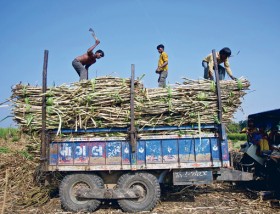
Gulf News | 11 August 2009
By Vidya Diwakar, Staff reporter
Dubai: The Gulf countries remain 'highly vulnerable' to commodity price volatility on international markets as they remain heavily dependent on imports, analysts say.
"The GCC countries are indeed highly vulnerable to global soft commodity price volatility since they import almost all of their foodstuff needs. When the dollar - to which the region's currencies are pegged - is weakening, there is a compounding effect to this rise in domestic food prices since it makes all imports even pricier," said Philippe Dauba-Pantanacce, Senior Economist at Standard Chartered Bank (SCB).
The forecast comes at a time when concern is rife that GCC countries may not be prepared for the global shock in commodity prices.
The recent surge in sugar prices on the international market is a reminder of the rice supply shortage two years ago, which pushed up prices of basmati rice and other varieties on local markets. Raw sugar prices peaked at near 28-year highs yesterday as sugar futures have surged by over 80 per cent on the international market this year to more than $0.22 a pound.
However, the good news is that the prices of other basic commodities have remained stable ahead of Ramadan.
"Besides sugar, which has been rising for the past three months, it is difficult to see for now a direct impact of rising soft commodity prices on GCC domestic prices as of today. Yet this is a risk in the upcoming months and this has also to be coupled with an assessment of the direction of the US dollar that we, at SCB, see weakening going forward," Dauba-Pantanacce said.
Gulf consumers experienced a massive increase in foodstuff prices a few years ago when retailers were forced to hike prices of rice, pulses and other essential commodities to match the price fluctuation on global markets, prompting some GCC governments to invest in agriculture to ensure food safety for their populations.
"There has been a lot of noise surrounding the farmland purchases and alleged investments of some Gulf countries on foreign soil to secure food access. But as of today there has not been any comprehensive quantifications of these undertakings and how it could benefit - or not - the investor country," Dauba-Pantanacce said.
According to a 2008 World Bank report on Middle East and North Africa (Mena) Economic Developments and Prospects, "the dramatic hike in food prices [is] directly linked to higher fertiliser costs, massively increased use of grains and fats for bio-fuels, and shrinking acreage utilised for feed and food".
The Mena overview concluded that higher inflation linked to these sources may be lasting, proving a "serious concern for macro-economic stability, export competitiveness and the welfare of the public".
Meanwhile, Saudi Arabia remains the Middle East's largest market for agricultural products and technologies, posting a steady eight per cent average annual growth. The kingdom imported more than 25.5 billion riyals worth of agricultural products in 2008, an increase of 42 per cent over the previous year.
The Saudi Government has been investing heavily in irrigation projects to develop its arable land, with the aim of addressing the needs of a rapidly growing population.












